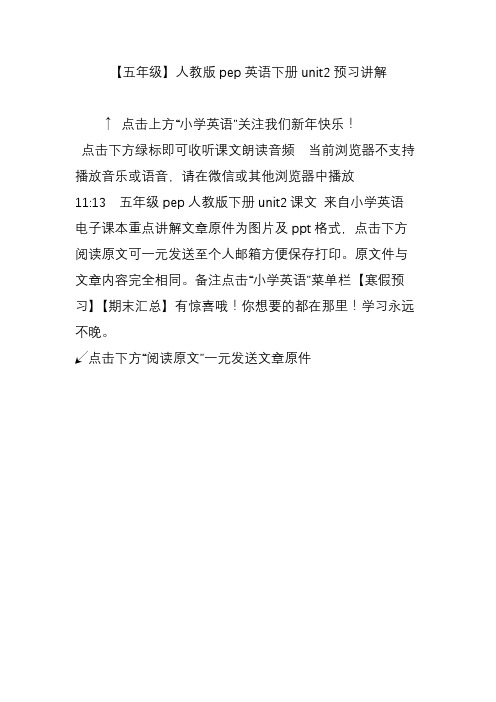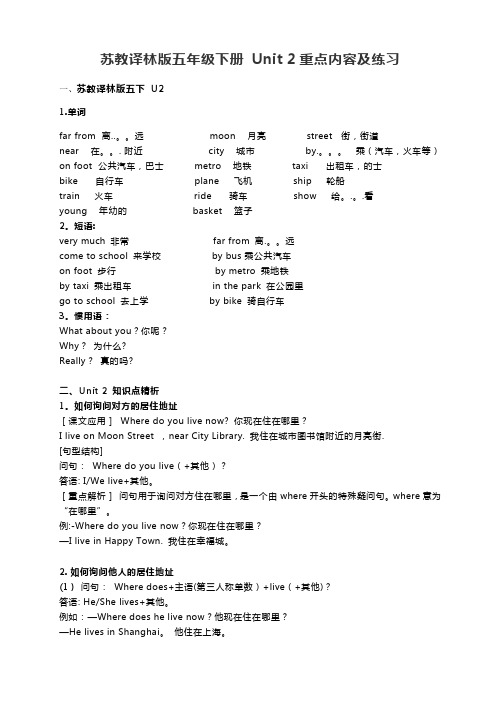五年级英语下册第二课课文解析
五年级下册人教版第二课祖父的园子笔记

五年级下册人教版第二课祖父的园子笔记English:In the second lesson of the fifth grade, the students learn about "Grandfather's Garden" in the People's Education Press textbook. The story tells the tale of a grandfather and his cherished garden, which he tends to with great care and dedication. The garden is filled with various plants and flowers, and it serves as a symbol of the grandfather's love and devotion to his family. The lesson discusses the importance of taking care of nature, the value of hard work and patience, and the beauty of family and tradition. Through the story, students learn about the significance of respecting and appreciating the environment and the efforts of those who work to maintain it.中文翻译:在人教版五年级的第二课中,学生们学习了《祖父的园子》这篇课文。
故事讲述了一个祖父和他珍爱的花园,祖父非常用心地照料着它。
园子里种满了各种各样的植物和花朵,它象征着祖父对家庭的爱与奉献。
五年级下册英语第二课祖父的园子笔记

五年级下册英语第二课祖父的园子笔记English:In the second lesson of the fifth grade textbook, the story "Grandfather's Garden" revolves around a young boy named Peter who spends the summer vacation at his grandfather's countryside home. Through his experiences in the garden, Peter learns the value of hard work, patience, and the beauty of nature. He helps his grandfather tend to the vegetables, flowers, and fruit trees, feeling a sense of pride and accomplishment as he witnesses the growth and bounty that result from their efforts. Peter also discovers the joy of spending time outdoors, enjoying the fresh air, sunshine, and simple pleasures that come from being surrounded by nature. The story serves as a reminder of the importance of connecting with the environment, appreciating the wonders of the natural world, and the fulfillment that comes from nurturing and caring for living things.中文翻译:在五年级课本的第二课中,故事《祖父的园子》围绕着一个叫彼得的小男孩展开,他在爷爷的乡间住所度过暑假。
Unit2Avisittothezoo课文原文及翻译闽教版英语五年级下册

闽教版小学英语五年级下册Unit2课文原文及翻译Unit 2 A Visit to the Zoo第二单元参观动物园Part AA部分1. Listen and follow.听录音并跟读。
Dad, I want to see elephants.爸爸,我想去看大象。
Where are they?它们在哪儿?Look, there is a map over there.看,那边有张地图。
Let' s go and have a look.我们过去看一看。
Go straight.直走。
Then turn right.然后右转。
There are some elephantsbehind the hill.小山后面就有一些大象。
Let's go.我们出发吧。
Wow. They're so tall and big.哇,它们又高又大啊。
Look, a baby elephant!看,一只象宝宝!It's lovely.它很可爱。
Let me take a photo of it.让我给它照张照片。
2. Look and say.看图说英语。
There is a map over there.那边有张地图。
There is a baby elephantin the zoo.动物园里有一只象宝宝。
There are some bears under the tree.树下面有一些熊。
There are some tigersnext to the lions.狮子旁边有一些老虎。
elephants tigers大象老虎bears monkeys熊猴子behind the hill 在山后面next to the lions 在狮子旁边under the tree 在树下beside the lake 在湖的旁边Where are the elephants? They are behind the hill.大象在哪里?它们在小山后面。
五年级下册英语冀教版第二课

五年级下册英语冀教版第二课English:In the second lesson of the Grade 5 English book of the JiJiao Edition, the main focus is on introducing family members and learning about their relationships. The lesson starts with vocabulary related to family members such as father, mother, brother, sister, grandfather, grandmother, uncle, aunt, cousin, and so on. Students are taughthow to use these words in sentences to describe their own families. They also learn about possessive pronouns like "my," "your," "his," "her," and "our" to talk about family members. The lesson includes interactive activities like asking and answering questions about family members, completing sentences with the correct possessive pronouns, and listening to dialogues about family relationships. By the end of the lesson, students are expected to be able to talk about their families confidently and accurately.中文翻译:冀教版五年级英语书第二课主要介绍了家庭成员并学习他们之间的关系。
【中文注释】五年级下册英语课文lesson 2

【中文注释】五年级下册英语课文lesson 2
现在小学英语的教学,并不给学生教授单词的音标,也不针翻译单词的具体意思,只是让学生知道课文中语句、对话的大概意思。
这样的结果是,孩子们可能看着课文会读,离开课本就基本上什么都不知道了。
因此,将课本(北京出版社)中的语句按照单词、语句每个都翻译,让孩子在朗读的时候就知道每个单词、每个句子的准确意思,明明白白地学习,十分有意义。
这样,笔者将英语课文进行了逐词、逐句的翻译,供有需要的家长和孩子们使用。
祝你们在英语学习上能更进步。
Lesson 2。
英语五年级下第二课课文

英语五年级下第二课课文一、课文标题标题:My Favorite Subject二、课文内容概述本文主要讲述了主人公最喜欢的科目,通过对话的形式,展现了主人公对这门科目的喜爱之情。
三、词汇学习1. favorite 最喜欢的2. subject 科目3. because 因为4. math 因为我喜欢数学5. science 科学6. English 英语7. P.E. 体育8. computer 电脑9. music 音乐10. reason 原因四、语法点解析1. 简单陈述句:本文中使用了大量的简单陈述句,如“I like math because it is interesting.”等。
2. 连词的使用:文章中使用了because、and等连词,连接各个句子,使文章流畅。
3. 名词单复数:本文中使用了名词的单复数形式,如“subjects”、“maths”等。
4. 冠词的用法:在文中出现了定冠词“the”和不定冠词“a”,如“I like the English teacher.”、“I have a math test on Friday.”等。
5. 缩略形式的运用:在文中出现了缩略形式,如“P.E.”表示“体育”,“T.V.”表示“电视”等。
6. 感叹句的使用:在文中出现了感叹句,如“What a fun class!”等。
7. 疑问句的运用:在文中出现了疑问句,如“Do you have a favorite subject?”等。
8. 现在进行时的运用:在文中出现了现在进行时的用法,如“I am having an English class now.”等。
9. there be句型的运用:在文中出现了there be句型,如“There are a lot of interesting things in this book.”等。
10. 祈使句的使用:在文中出现了祈使句,如“Please take out your math books.”等。
【五年级】人教版pep英语下册unit2预习讲解

【五年级】人教版pep英语下册unit2预习讲解
↑ 点击上方“小学英语”关注我们新年快乐!
点击下方绿标即可收听课文朗读音频当前浏览器不支持播放音乐或语音,请在微信或其他浏览器中播放
11:13 五年级pep人教版下册unit2课文来自小学英语电子课本重点讲解文章原件为图片及ppt格式,点击下方阅读原文可一元发送至个人邮箱方便保存打印。
原文件与文章内容完全相同。
备注点击“小学英语”菜单栏【寒假预习】【期末汇总】有惊喜哦!你想要的都在那里!学习永远不晚。
↙点击下方“阅读原文”一元发送文章原件。
苏教译林版五年级下册 Unit 2重点内容及练习

苏教译林版五年级下册Unit 2重点内容及练习一、苏教译林版五下U21.单词far from 离..。
远moon 月亮street 街,街道near 在。
. 附近city 城市by.。
乘(汽车,火车等)on foot 公共汽车,巴士metro 地铁taxi 出租车,的士bike 自行车plane 飞机ship 轮船train 火车ride 骑车show 给。
.。
.看young 年幼的basket 篮子2。
短语:very much 非常far from 离.。
远come to school 来学校by bus 乘公共汽车on foot 步行by metro 乘地铁by taxi 乘出租车in the park 在公园里go to school 去上学by bike 骑自行车3。
惯用语:What about you?你呢?Why?为什么?Really?真的吗?二、Unit 2 知识点精析1。
如何询问对方的居住地址[课文应用]Where do you live now? 你现在住在哪里?I live on Moon Street ,near City Library. 我住在城市图书馆附近的月亮街.[句型结构]问句:Where do you live(+其他)?答语: I/We live+其他。
[重点解析]问句用于询问对方住在哪里,是一个由where开头的特殊疑问句。
where意为“在哪里”。
例:-Where do you live now?你现在住在哪里?—I live in Happy Town. 我住在幸福城。
2.如何询问他人的居住地址(1)问句:Where does+主语(第三人称单数)+live(+其他)?答语: He/She lives+其他。
例如:—Where does he live now?他现在住在哪里?—He lives in Shanghai。
他住在上海。
(2) 问句: Where do+主语(第三人称复数)+live(+其他)?答语:They live+其他。
- 1、下载文档前请自行甄别文档内容的完整性,平台不提供额外的编辑、内容补充、找答案等附加服务。
- 2、"仅部分预览"的文档,不可在线预览部分如存在完整性等问题,可反馈申请退款(可完整预览的文档不适用该条件!)。
- 3、如文档侵犯您的权益,请联系客服反馈,我们会尽快为您处理(人工客服工作时间:9:00-18:30)。
第二课课文解析
1.—What’s your favourite season, Chen Jie?—陈洁,你最喜欢什么季节?
—Winter.—冬天。
What’s your favourite...? 意思为“你最喜欢的……是什么?”,用来询问别人的喜好。
完整的回答是:My favourite...is...,也可以直接回答。
eg: —What’s your favourite colour?—你最喜欢的颜色是什么?
—Yellow.—黄色。
2. Which season do you like best? 你最喜欢哪个季节?
本句用来询问别人最喜欢哪个季节。
which是疑问代词,意思为“哪一个”,常放在句首。
eg 1: Which book do you like? 你喜欢哪一本书?
拓展:best意思为“最;极”,句中用来表示强调。
eg 2:I like spring best. 我最喜欢春天。
3. Why do you like spring? 你为什么喜欢春天?
本句中why为什么 why 是疑问副词,用来提问原因,常在句首,用because作答。
eg: —Why do you like spring?—你为什么喜欢春天?
—Because it’s warm in spring.—因为春天暖和。
联想:以wh开头的疑问词还有what什么; who谁;when什么时候;which哪一个; where哪里。
4. It’s always sunny and cool.秋天总是阳光灿烂,天气凉爽。
本句中always “总是”,是副词,同前面学过的often, sometimes, usually 都是表示频率的词,通常放在be动词之后,实义动词之前。
eg: There is always love in family. 家中总是充满了爱。
拓展:反义词:never从不
5. I can play with snow. 我可以玩雪。
本句中play with...玩……
eg: They like to play with snow. 他们喜欢在冬天玩雪。
拓展:play with snow玩雪
词汇学习
1. spring n.(春天)
eg: It is warm in spring.春天很暖和。
搭配:in spring在春天
联想:warm暖和的 windy有风的
2. summer n.(夏天)
eg: What’s the weather like in summer?夏天的天气怎么样?
搭配:summer holiday暑假
联想:hot炎热的
3. fall n.(秋天)
eg 1: Do you like fall?你喜欢秋天吗?
拓展:fall还可以作动词,意思为“落下,下降”。
eg 2: The leaves fall (落下) in fall (秋天).叶子在秋天凋落。
助记:fall=f+all(全,都)
4. winter n.(冬天)
eg: Winter is cold in Beijing.北京的冬天很寒冷。
搭配:winter holiday寒假 Winter Sports冬季运动会
联想:cold 寒冷的 snowy下雪的
5. season n.(季节)
eg: There are four seasons in a year.一年中有四季。
sea(大海)+son(儿子)+season(季节)
6. swim v.(游泳)
eg: —Can you swim?—你会游泳吗?
—Yes, I can.—是的,我会。
搭配:go swimming 去游泳 swimming pool游泳池
7. fly kites(放风筝)
eg 1: Let’s fly kites in the playground.让我们在操场上放风筝吧。
拓展:fly作动词,意思为“飞,放”。
eg 2: The birds fly in the sky.鸟儿在天空中飞。
注意:fly kites= fly a kite 都表示“放风筝”,注意分清短语中kite的单、复数形式。
8. skate v.(滑冰;滑冰鞋)
eg: You can skate in winter.你可以在冬天滑冰。
搭配:go skating 去滑冰
roller skates 四轮滑冰鞋 skateboard滑板
9. make a snowman n.(堆雪人)
eg: I like to make a snowman.我喜欢堆雪人。
联想:make the bed铺床 make friends交朋友
助记:snow(雪)+man(人)=snowman(雪人)
10. plant trees(种树)
eg 1: The students always plant trees in spring.学生们总是在春天种树。
拓展:这里plant作动词,意思为“种植”;还可以作名词,意思为“植物”。
eg 2: a tomato plant
11. leaf n.叶子
eg: The leaves turn yellow in fall. 秋天叶子变黄了。
拓展:复数形式:leaves
联想:green leaves绿叶
12. because conj.(因为)
eg: —Why do you like summer?—你为什么喜欢夏天?
—Because I can eat much ice-cream. —因为我可以吃冰淇淋。
拓展:because用来回答由why 引导的疑问句,常放在句子开头。
13. sleep v.(睡觉)
eg: They sleep in winter.它们冬眠。
搭配:go to sleep入睡,睡着
拓展:wake up醒来
语法学习
1. 询问原因的特殊疑问句及其应答。
我们常用疑问副词why来询问原因,并且放在句首。
回答这样的提问用because。
eg 1: —Why do you like winter?—你为什么喜欢冬天?
—Because I can sleep a long time.—因为我可以睡很长时间。
eg 2: —Why do you like summer?—你为什么喜欢夏天?
—Because I can swim in the lake.—因为我可以在湖里游泳。
另外,以wh开头的疑问词还有,what, who, when, which。
2. 询问别人的喜好以及回答。
我们一般常用Which is your favourite...?来询问别人的爱好。
回答时用:My favourite...is...,也可以直接回答。
eg: —Which is your favourite season? —你最喜欢哪个季节?—My favourite season is spring. —我最喜欢春天。
